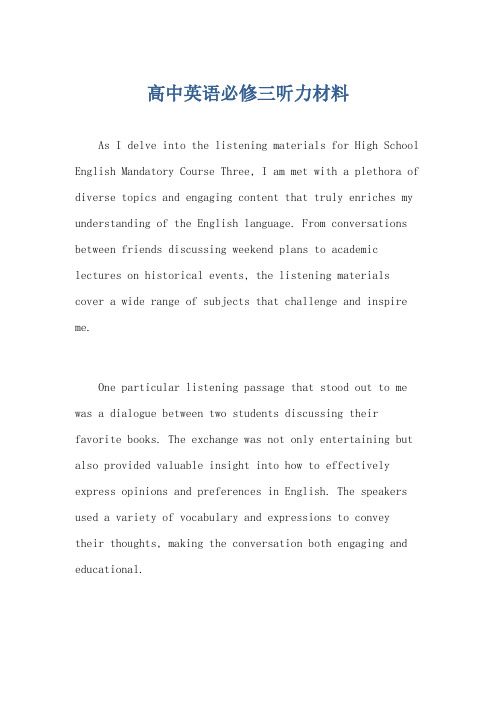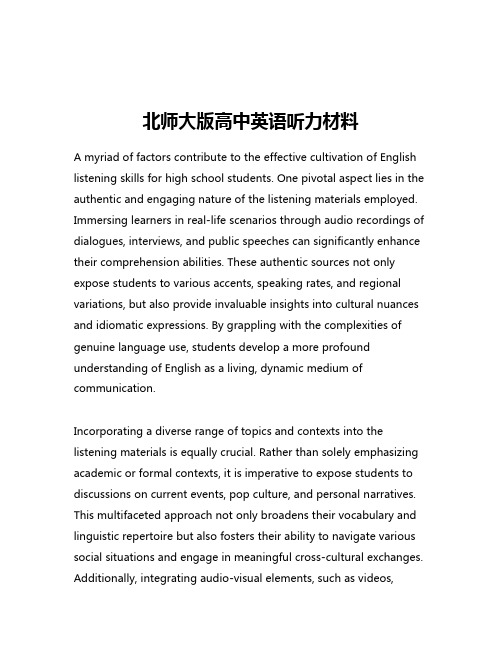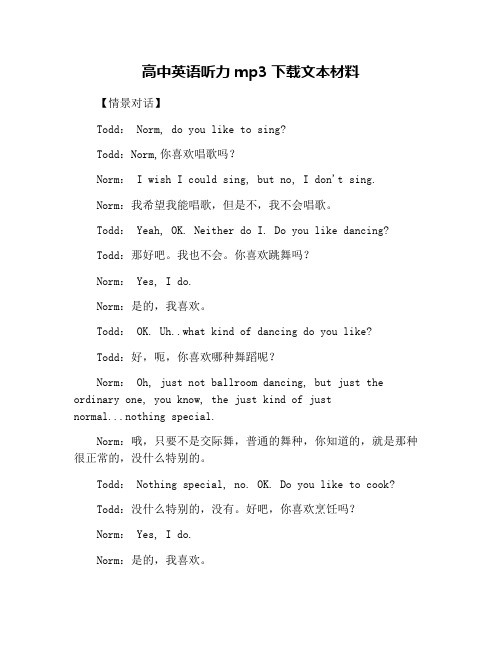高中英语听力下载习题材料
- 格式:docx
- 大小:38.05 KB
- 文档页数:5

高中英语听力下载材料答案第一节(共5小题)听下面5段对话。
每段对话后有一个小题,从题中所给的A、B、C 三个选项中选出选项,并标在试卷的相对应位置。
听完每段对话后,你都有10秒钟的时间来回答相关小题和阅读下一小题。
每段对话仅读一遍。
1.When will the headmaster come back?A.11:45.B.9:30.C.12:40.2.Who has Mr.Jones called to come over?A.A salesman.B.A telephone repairman.C.An electrician.3.Who do they want to replace?A.Their music teacher.B.Their English teacher.C.Their maths teacher.4.What does the man usually do in the evening?A.Watch TV.B.See a new film.C.Study.5.How does the woman feel at the man’s words?A.Excited.B.Surprised.C.Frightened.第二节(共15小题)听下面5段对话或独白。
每段对话或独白后有几个小题,从题中所给的A、B、C三个选项中选出选项,并标在试卷的相对应位置。
听每段对话或独白前,你将有时间阅读各个小题,每小题5秒钟;听完后,各小题将给出5秒钟的作答时间。
每段对话或独白读两遍。
听第6段材料,回答第6至7题。
6.What is the man?A.A guide.B.A houseman.C.A policeman.7.What happened to the woman?A.Her leg was broken.B.Her money was stolen.C.Her briefcase was gone.听第7段材料,回答第8至10题。

第一部分:听力(共两节,满分30 分)第一节(共 5 小题;每小题 1.5 分,满分 7.5 分)请听下面 5 段对话,选出最佳选项。
1.What are the two speakers going to buy?A. Bread.B. Cheese.C. Eggs.2.How does the woman find the fish?A. Just so-so.B. Bad.C. Quite good.3.What does the woman mean?A. Mark should go on with the game.B. Mark should draw pictures on the computer.C. Mark should review his lessons.4.Where does the conversation take place?A. In the bookstore.B. In the library.C. In the classroom.5.Why doesn’ t Jane eat her chocolate cake?A. She doesn ’ t like chocolate.B. She has trouble with her tooth.C.She has no tooth.第二节(共 15 小题 ; 每小题 1.5 分,满分 22.5 分)请听下面 5 段对话或独白,选出最佳选项。
请听第 6 段材料,回答第6、7 题。
6.In which department can this conversation most probably take place?A. Shoe Department.B. Clothing Department.C. Jewelry Department.7.What could be the reason if the woman does not buy the overcoat?A. The color.B. The size.C. The price.请听第 7 段材料,回答第 8 至 10 题。

遂宁市高中2016级第二学期教学水平监测英语试题听力录音材料遂宁市高中2016级第二学期教学水平监测英语试题听力部分。
该部分分为第一、第二两节。
注意,回答听力部分时,请先将答案标在试卷上。
听力部分结束前,你将有两分钟的时间将试卷上的答案转涂到客观题答题卡上。
请看听力部分第一节。
听下面5段对话。
每段对话后有一个小题,从题中所给的A、B、C三个选项中选出最佳选项,并标在试卷的相应位置。
听完每段对话后,你都有10秒钟的时间来回答有关小题和阅读下一小题。
每段对话仅读一遍。
停顿00’02”现在你有5秒钟的时间阅读第一小题的有关内容。
停顿00’05”哗---(提示音)Text 1M: Excuse me, where’s the nearest bank, please?W: Go along this street, and turn left. You’ll see the bank next to the post office.M: Thank you.停顿00’10”哗---Text 2M: Jane. Why don't you stay in bed? You are not all right today.W: Oh, no. I'm feeling well this morning. I'll go on a holiday.停顿00’10”哗---Text 3W: My glasses are broken. I can't go to the cinema with you today.M: Never mind. Let's listen to the radio at home instead.停顿00’10”哗---Text 4W: Have you ever been to New York?M: Not yet. But I hope to visit it some day after I leave school.停顿00’10”高一英语试题听力录音材料第1页(共4页)哗---Text 5M: Where are you going, Lucy?W: I’m going to the library.M: Look at the clouds. It may rain later. Take this umbrella.停顿00’5”哗---第一节到此结束第二节听下面五段对话或独白,每段对话或独白后有几个小题,从题中所给的A、B、C三个选项中选出最佳选项。

高中英语听力练习题篇1第一节(共5小题)听下面5段对话。
每段对话后有一个小题,从题中所给的A、B、C三个选项中选出最佳选项,并标在试卷的相应位置。
听完每段对话后,你都有10秒钟的时间来回答有关小题和阅读下一小题。
每段对话仅读一遍。
1.What is the possible relationship between the two speakers?A.Employer and employee.B.Next door neighbors.C.Two good friends.2. What will the two speakers most probably do this weekend?A.See a film.B.Climb a mountain.C.Play table tennis.3.What time will the train leave?A.At 6:10 tomorrow morning.B.At 11:00 tonight.C.At 11:00 tomorrow morning.4.What does the man mean?A.He is waiting for someone else.B.He doesn’t want to talk with Mr Miller.C.He is busy now.5.Where does the conversation take place?A.In a restaurant.B.In a department store.C. In a hotel.第二节(共15小题)听下面5段对话或独白。
每段对话或独白后有几个小题,从题中所给的A、B、C三个选项中选出最佳选项,并标在试卷的相应位置。
听每段对话或独白前,你将有时间阅读各个小题,每小题5秒钟;听完后,各小题将给出5秒钟的作答时间。
每段对话或独白读两遍。
听第6段材料,回答第6至8题。

2020年高中英语听力下载材料★###英语听力频道为大家整理的2020年高中英语听力下载材料,供大家参考。
更多阅读请查看本站频道。
第一节(共5小题)听下面5段对话。
每段对话后有一个小题,从题中所给的A、B、C 三个选项中选出选项,并标在试卷的相对应位置。
听完每段对话后,你都有10秒钟的时间来回答相关小题和阅读下一小题。
每段对话仅读一遍。
1.How much was the TV set?A.$60.B.$120.C.$90.2.What does the man mean?A.Tom was talking with the postman.B.Tom was running around the corner.C.Tom was helping the postman with his work.3.What does the man want to do?A.Buy a fan.e electricity.C.Cool himself down.4.Why did the boss criticize Joseph?A.He was late for work.B.He quarrelled with the man speaker.C.He criticized the man speaker too seriously.5.Who is Fiona?A.The woman speaker.B.Thompson’s sister.C.Daisy’s sister.第二节(共15小题)听下面5段对话或独白。
每段对话或独白后有几个小题,从题中所给的A、B、C三个选项中选出选项,并标在试卷的相对应位置。
听每段对话或独白前,你将有时间阅读各个小题,每小题5秒钟;听完后,各小题将给出5秒钟的作答时间。
每段对话或独白读两遍。
听第6段材料,回答第6至8题。
6. What was the weather like last week?A.Nice and sunny.B.Too warm.C.Neither hot nor cold.7. What season is it now?A.Summer.B.Winter.C.Autumn.8.What does the man think the weather will be like this weekend?A.He thinks it’ll rain.B.He doesn’t think it’ll rain.C.He thinks it’ll be cloudy.听第7段材料,回答第9至11题。

英语听力/模拟试题高中英语听力习题资料第一节(共5小题)听下面5段对话。
每段对话后有一个小题,从题中所给的A、B、C三个选项中选出选项,并标在试卷的相应位置。
听完每段对话后,你都有10秒钟的时间来回答有关小题和阅读下一小题。
每段对话仅读一遍。
1.What season is it now?A.Summer.B.Winter.C.Autumn.2.What does the woman mean?A.She doesn’t have a bike.B.Her mother made up the story.C.She didn’t tell the man the truth.3.What is the woman most probably?A.A clerk.B.A librarian.C.A waitress.4.Where is the woman going for holiday this year?A.Canada.B.Turkey.C.Italy.5.What does the man mean?A.He doesn’t want the woman to open the window.B.He has caught a cold.C.It’s too cold outside.第二节(共15小题)听下面5段对话或独白。
每段对话或独白后有几个小题,从题中所给的A、B、C三个选项中选出选项,并标在试卷的相应位置。
听每段对话或独白前,你将有时间阅读各个小题,每小题5秒钟;听完后,各小题将给出5秒钟的作答时间。
每段对话或独白读两遍。
听第6段材料,回答第6至8题。
6.What’ s the weather like?A.Warm and sunny.B.Cold and cloudy.C.Snowy.7.Who will drive the man to work?A.The man himself.B.The woman.C.Fred.8.When is it now?A.In the morning.B.At home.C.In the evening.听第7段材料,回答第9至11题。

新人教英语必修三听力材料English.Unit 1: Youth and Trends.Section A: A Visit to the Book Fair.Passage 1:As I stepped into the bustling halls of the book fair, I was immediately struck by the vibrant tapestry of people and books that filled the space. From young children wide-eyed with wonder at the shelves adorned with colorful spines to senior citizens poring over historical tomes, the fair was a microcosm of humanity's enduring love for the written word. Books of all shapes, sizes, and genres lined the aisles, inviting visitors to embark on literary adventures and broaden their horizons. As I meandered through the labyrinthine pathways, I couldn't help but notice the diverse array of languages and culturesrepresented, a testament to the universal appeal of storytelling.Passage 2:Amidst the throng of bookworms, I stumbled upon a particularly engaging booth where a young entrepreneur was showcasing his latest creation—a sleek and innovative e-reader. With its crystal-clear display, powerful processor, and extensive library of digital content, the device promised an immersive and customizable reading experience. As I listened to the enthusiastic pitch, I couldn't help but marvel at the ingenuity of this young inventor, who had harnessed technology to enhance the age-old tradition of reading.Section B: Beyond the Classroom.Passage 3:Venturing beyond the traditional confines of the classroom, I engaged in lively discussions with severalstudents who were actively involved in extracurricular activities. From the robotics club's enthusiastic pursuit of STEM challenges to the debate team's passionate exchanges of ideas, it became evident that learning extended far beyond textbooks and lectures. These students were actively shaping their futures, developing essential skills that would serve them well in their professional and personal lives.Passage 4:Inspired by the boundless potential of youth, I sought out a group of young volunteers who were tirelessly working to make their community a better place. Whether it was organizing clean-up drives, mentoring underprivileged children, or promoting environmental awareness, these young change-makers were demonstrating that passion and dedication could ignite positive social change. Their unwavering efforts filled me with hope for the future, reminding me that the world is in the capable hands of a generation that is eager to leave its mark.中文回答。

高二英语听力mp3下载练习材料Unit 1Part A Short ConversationsDirections: In Part A, you will hear ten short conversations between two speakers. At the end of each conversation, a question will be asked about what was said. The conversations and the questions will be spoken only once. After you hear a conversation and the question about it, read the three or four possible answers on your paper, and decide which one is the best answer to the question you have heard.Short Conversation A(职业与人物关系)()1. A. A worker. B. A driver. C. A teacher.()2. A. Miss Grey. B. Mr White. C. Mr Brown.()3. A. A driver. B. A policeman. C. A gatekeeper.()4. A. Teacher. B. Journalist. C. Student.()5. A. Teacher and student. B. Classmates. C. Mother and son.Short Conversation B() 6. A. What she should wear.B. Where the man lives.C. Who will speak at the meeting.D. Why the meeting is necessary.() 7. A. Something happened to her car.B. She was sick.C. She said that she was late.D. She decided to buy a new car.() 8. A. At a theatre.B. At a booking office.C. At a railway station.D. At a restaurant.() 9. A. Mother and son.B. Customer and assistant.C. Teacher and student.D. Doctor and nurse.()10. A. Attend the birthday party.B. Miss the birthday party.C. Go home.D. Feel unhappy at the party.Part B PassagesDirections: In Part B, you will hear two short passages, and you will be asked three questions on each of the passages. The passages will be read twice but the questions will be spoken only once. When you hear a question, read the four possible answers on your paper and decide which one would be the best answer to the question you have heard.Questions 11 through 13 are based on the following passage.()11. A. Polite behavior.B. Kind behavior.C. Helpful behavior.D. All of the above.()12. A. To show that he has enjoyed it.B. To show that he has had enough.C. To show that he is very thirsty.D. To show that he is poor.()13. A. Different manners.B. Good manners.C. Bad manners.D. Customs of other races.Questions 14 through 16 are based on the following passage.()14. A. Because they try hard to take care of their owners’ houses.B. Because they always do as much work as possible for their masters.C. Because they need someone to look after them.D. Because they try their best to make their owners happy.()15. A. The owner of a large German dog.B. The name of a dog.C. The author’s friend.D. The name of a young man.()16. A. He always manages to give his owner pleasure.B. He likes to sit in front of a visitor.C. He always wants his master to please him.D. He is more intelligent than many other dogs.Part C Longer ConversationDirections: In Part C, you will hear one longer conversation. The conversation will be read twice. After you hear the conversation, you are required to fulfill in the numbered blanks with the information you have heard. Write your answers on your answer sheet.Blanks 17 through 20 are based on the following conversation.Where can the dictionary be used?How many books can be borrow at a time?How long can he keep them?Where does he have to sign his name? In(17)______.(18)______ at a time.(19)______.On(20)______.Complete the form. Write no more than THREE WORDS for each answer.Part D Listen and Repeat(重点词组与句型结构)Directions: In Part D, you will hear five sentences. While listening, take some notes to help you. The sentences will be read twice. After you have heard each sentence, repeat it.1. _______________________________________2. _______________________________________3. _______________________________________4. _______________________________________5. _______________________________________。

高中英语听力练习(打印版)目标本文档为高中英语研究者提供一份打印版的听力练材料,旨在帮助学生提高听力技能。
准备材料- 打印机- 打印纸- 筆和红笔步骤1. 打印材料- 使用打印机将听力材料打印出来。
- 建议使用A4大小的打印纸,以便能够清晰地阅读和记录。
2. 阅读指导- 在开始听力练之前,仔细阅读听力材料中的指导。
- 了解每个练的要求和注意事项。
3. 听力练- 按照听力材料中的顺序,逐个练各个听力题目。
- 使用听力材料中提供的录音文件或外部资源进行听力训练。
- 务必全神贯注地聆听,并尽量不要看听力材料上的答案。
4. 做题和纠错- 针对每个听力练题目,用红笔在听力材料上标记你认为正确的答案。
- 完成听力练后,再次听录音核对答案。
- 记下每个题目的得分和做错的地方,以便后续复和提高。
5. 分析和总结- 仔细分析那些你答错的题目,找出错误的原因。
- 根据错误的类型,例如是听力理解还是词汇问题,制定相应的研究计划。
- 总结你在听力练中的优点和不足,思考如何改进。
6. 反复练- 根据你的分析和总结,制定每日听力练计划。
- 每天坚持练,逐渐提高听力技能。
注意事项- 在做听力练时,选择一个安静的环境以确保听力效果最佳。
- 在听录音时,可以适当调整音量以适应自己的需要。
- 做题时,尽量在规定的时间内完成,然后立即检查答案。
- 对于做错的题目,不要灰心,要多加练并找出改进的办法。
以上就是高中英语听力练习(打印版)的内容。
祝你顺利提高听力技能!。

高中英语必修三听力材料As I delve into the listening materials for High School English Mandatory Course Three, I am met with a plethora of diverse topics and engaging content that truly enriches my understanding of the English language. From conversations between friends discussing weekend plans to academic lectures on historical events, the listening materials cover a wide range of subjects that challenge and inspire me.One particular listening passage that stood out to me was a dialogue between two students discussing their favorite books. The exchange was not only entertaining but also provided valuable insight into how to effectively express opinions and preferences in English. The speakers used a variety of vocabulary and expressions to conveytheir thoughts, making the conversation both engaging and educational.In addition to casual conversations, the listening materials also include more formal settings such aslectures and presentations. One lecture that I found particularly fascinating was on the topic of climate change. The speaker presented compelling evidence and arguments to support the need for immediate action to address this pressing issue. Not only did I learn valuable information about the environment, but I also honed my listening skills by following along with the complex scientific concepts presented.Furthermore, the listening materials also include interviews with experts in various fields, providing valuable insights and perspectives on a wide range of topics. One interview that left a lasting impression on me was with a renowned psychologist discussing the importanceof mental health awareness. The interview shed light on the significance of addressing mental health issues and offered practical advice on how to support those in need.Overall, the listening materials for High School English Mandatory Course Three have been instrumental in enhancing my English proficiency and broadening my knowledge on a myriad of subjects. The diverse range of topics covered in the materials has not only improved my listening comprehension but has also sparked my interest in exploring new areas of study. I look forward to continuing to engage with these materials and furthering my understanding of the English language.。

北师大版高中英语听力材料A myriad of factors contribute to the effective cultivation of English listening skills for high school students. One pivotal aspect lies in the authentic and engaging nature of the listening materials employed. Immersing learners in real-life scenarios through audio recordings of dialogues, interviews, and public speeches can significantly enhance their comprehension abilities. These authentic sources not only expose students to various accents, speaking rates, and regional variations, but also provide invaluable insights into cultural nuances and idiomatic expressions. By grappling with the complexities of genuine language use, students develop a more profound understanding of English as a living, dynamic medium of communication.Incorporating a diverse range of topics and contexts into the listening materials is equally crucial. Rather than solely emphasizing academic or formal contexts, it is imperative to expose students to discussions on current events, pop culture, and personal narratives. This multifaceted approach not only broadens their vocabulary and linguistic repertoire but also fosters their ability to navigate various social situations and engage in meaningful cross-cultural exchanges. Additionally, integrating audio-visual elements, such as videos,podcasts, or short films, can further enrich the learning experience by providing visual cues and contextual clues that support auditory comprehension.Beyond the inherent qualities of the materials themselves, it is essential to adopt a systematic and scaffolded approach to their integration into the curriculum. Pre-listening activities, such as previewing vocabulary, activating background knowledge, and setting clear objectives, can prime students for more effective listening. During the listening phase, employing strategies like note-taking, visual organizers, or graphic representations can assist learners in organizing and retaining information more effectively. Post-listening tasks, including discussions, summarization exercises, or critical analyses, reinforce understanding and encourage higher-order thinking skills.Moreover, leveraging technology can significantly enhance the accessibility and engagement of listening materials. Digital platforms, language learning apps, and online resources offer a wealth of opportunities for personalized practice, self-paced learning, and immediate feedback. Incorporating interactive elements, such as quizzes, comprehension checks, or gamified activities, can further motivate and actively involve students in the listening process.It is also crucial to acknowledge the diverse learning styles andindividual needs of students. Offering differentiated listening materials and activities that cater to various proficiency levels, interests, and cognitive preferences can foster an inclusive and equitable learning environment. By embracing neurodiversity and providing accommodations for students with specific learning needs, educators can ensure that every learner has the opportunity to develop their English listening skills to the fullest extent.Ultimately, the selection and utilization of high-quality listening materials in high school English curricula play a pivotal role in shaping proficient and confident listeners. By immersing students in authentic language contexts, fostering cross-cultural understanding, and leveraging pedagogical best practices, educators can empower their learners to navigate the complexities of spoken English with ease and confidence. It is through this comprehensive approach that students can truly unlock the doors to effective communication and global interconnectedness in our increasingly interconnected world.。

高中英语听力下载练习试题第一节(共5小题)听下面5段对话。
每段对话后有一个小题,从题中所给的A、B、C 三个选项中选出选项,并标在试卷的相对应位置。
听完每段对话后,你都有10秒钟的时间来回答相关小题和阅读下一小题。
每段对话仅读一遍。
1.What does the woman want to do?A.To have an Xray.B.To go to the hospital.C.To help the wounded man.2.Where and when will the meeting be held?A.Room 303,3:00 pm.B.Room 303,2:00 pm.C.Room 302,2:00 pm.3.When would Thomas and Lily like to leave?A.Tomorrow.B.Next Monday or Tuesday.C.This Monday.4.What is the man’s choice?A.He prefers train for trip.B.He doesn’t like traveling.C.Not mentioned.5.According to the woman, what should the man do at first?A.He should ask about the flat on the phone.B.He should read the advertisements for flats in the newspaper.C.He should phone and make an appointment.第二节(共15小题)听下面5段对话或独白。
每段对话或独白后有几个小题,从题中所给的A、B、C三个选项中选出选项,并标在试卷的相对应位置。
听每段对话或独白前,你将有时间阅读各个小题,每小题5秒钟;听完后,各小题将给出5秒钟的作答时间。

第一部分:听力(共两节,满分30分)第一节(共5小题;每小题1.5分,满分7.5分)请听下面5段对话,选出最佳选项。
1. What are the two speakers going to buy?A. Bread.B. Cheese.C. Eggs.2. How does the woman find the fish?A. Just so-so.B. Bad.C. Quite good.3. What does the woman mean?A. Mark should go on with the game.B. Mark should draw pictures on the computer.C. Mark should review his lessons.4. Where does the conversation take place?A. In the bookstore.B. In the library.C. In the classroom.5. Why do esn’t Jane eat her chocolate cake?A. She doesn’t like chocolate.B. She hastrouble with her tooth.GAGGAGAGGAFFFFAFAFC. She has no tooth.第二节(共15小题; 每小题1.5分,满分22.5分)请听下面5段对话或独白,选出最佳选项。
请听第6段材料,回答第6、7题。
6. In which department can this conversation most probably take place?A. Shoe Department.B. Clothing Department.C. Jewelry Department.7. What could be the reason if the woman does not buy the overcoat?GAGGAGAGGAFFFFAFAFA. The color.B. The size.C. The price.请听第7段材料,回答第8至10题。

高中英语听力mp3下载文本材料【情景对话】Todd: Norm, do you like to sing?Todd:Norm,你喜欢唱歌吗?Norm: I wish I could sing, but no, I don't sing.Norm:我希望我能唱歌,但是不,我不会唱歌。
Todd: Yeah, OK. Neither do I. Do you like dancing?Todd:那好吧。
我也不会。
你喜欢跳舞吗?Norm: Yes, I do.Norm:是的,我喜欢。
Todd: OK. Uh..what kind of dancing do you like?Todd:好,呃,你喜欢哪种舞蹈呢?Norm: Oh, just not ballroom dancing, but just the ordinary one, you know, the just kind of justnormal...nothing special.Norm:哦,只要不是交际舞,普通的舞种,你知道的,就是那种很正常的,没什么特别的。
Todd: Nothing special, no. OK. Do you like to cook?Todd:没什么特别的,没有。
好吧,你喜欢烹饪吗?Norm: Yes, I do.Norm:是的,我喜欢。
Todd: OK. What, what do you like to cook?Todd:好的,你喜欢做什么呢?Norm: I like to cook vegetables, yeah. Vegetables! OK.Norm:我喜欢做蔬菜。
是的,蔬菜。
Todd: And do you like to exercise?Todd:你喜欢做运动吗?Norm: Very much so I go, I used to go to the gym three times a week before I arrived in Tokyo.Norm:非常喜欢,在来到东京之前,我一星期要去3次健身房。
高中英语听力下载习题材料
第一节(共5小题)
听下面5段对话。
每段对话后有一个小题,从题中所给的A、B、C 三个选项中选出选项,并标在试卷的相对应位置。
听完每段对话后,你都有10秒钟的时间来回答相关小题和阅读下一小题。
每段对话仅读一遍。
1.What’s wrong with Henry?
A.He was in hospital.
B.He had a heart attack.
C.He was late for work.
2.How many American soldiers have been killed in wars?
A.320,000.
B.400,000.
C.200,000.
3.How is the man going to Pittsburgh?
A.By taxi.
B.By train.
C.By subway.
4.Where does the dialogue take place?
A.In a bookshop.
B.In a library.
C.In the reading room.
5.What does the woman mean?
A.She doesn’t like singing.
B.She has just downloaded some new songs from the Internet.
C.She can’t sing any songs.
第二节(共15小题)
听下面5段对话或独白。
每段对话或独白后有几个小题,从题中所给的A、B、C三个选项中选出选项,并标在试卷的相对应位置。
听每段对话或独白前,你将有时间阅读各个小题,每小题5秒钟;听完后,各小题将给出5秒钟的作答时间。
每段对话或独白读两遍。
听第6段材料,回答第6至8题。
6.What does the woman prefer?
A.A cheap hotel.
B.A modern hotel.
C.An expensive hotel.
7.Where is the hotel the woman prefers?
A. Next to a bank.
B.Opposite to a supermarket.
C.Next to a restaurant.
8.Where does the conversation most probably take place?
A.Near a bank.
B.Near a hotel.
C.In a restaurant.
听第7段材料,回答第9至11题。
9.Why is the mother leaving?
A.Because there is going to be a flood.
B.Because she is going to help the flooded people.
C.Because she is going to look after the patients in the hospital.
10.What is the family like?
A.The family is full of care and love.
B.The boy’s father is too busy to ask for a leave.
C.The mother never cares for her son.
11.Who will pick the boy up after school when his mother leaves?
A.His father.
B.His grandfather.
C.No one.
听第8段材料,回答第12至14题。
12.What are the speakers talking about?
A.A job.
B.A job interviewee.
C.An employee.
13.What does the woman think of Candy?
A.She was unconfident.
B.She was impressive.
C.She was nervous.
14.What worried the man most about Candy?
A.Her dress.
B.Her speech.
C.Her behavior.
听第9段材料,回答第15至17题。